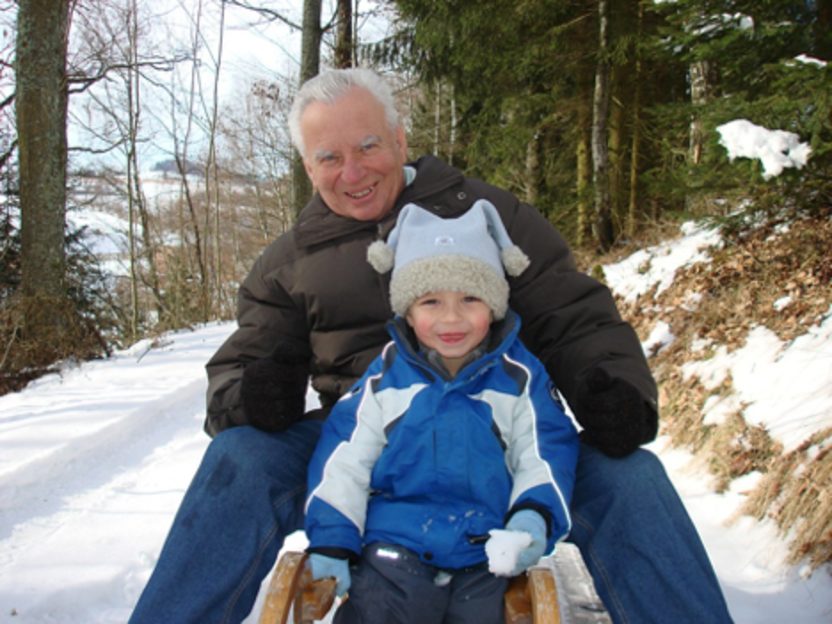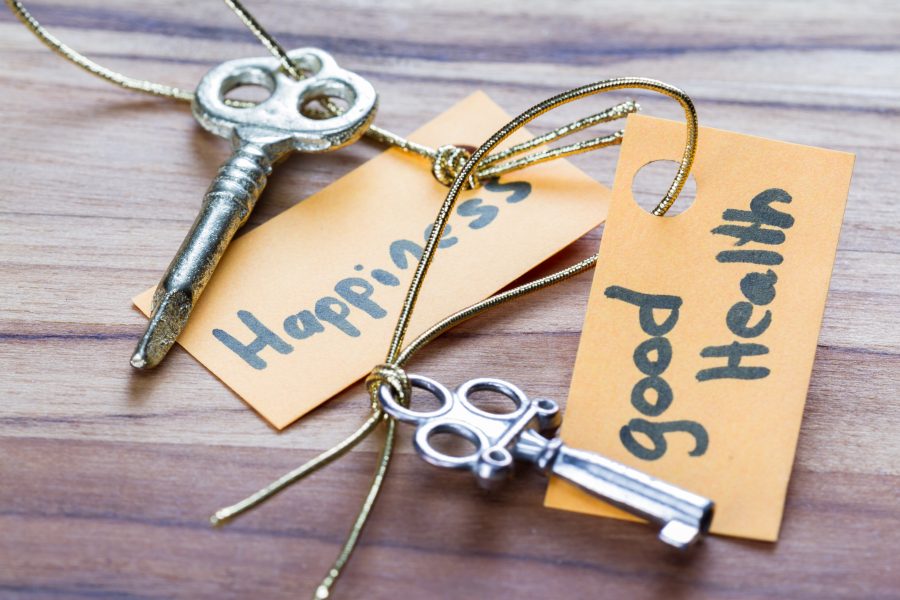Melynda struggled with depression beginning in her late teens. Today she bravely shares her story of recovery to help inspire others to seek help. #BellLetsTalk pic.twitter.com/4jtyUjJ5Tn
— Bell Let's Talk (@Bell_LetsTalk) January 10, 2019
10 ways to handle holiday stress
There are many wonderful things that come with the holidays – time with friends and family, lots of tasty treats, a break from work to binge-watch the latest Netflix show. But this time of year, can also bring its own set of stresses and pressures that if you don’t plan for or take care of can leave you feeling overwhelmed or anxious.
To help make this season a true season of joy, we have a few suggestions for you to take care of yourself over the holidays and make sure your mental and physical health are well taken care of:
Make a plan
This busy time of year is filled with social events, shopping, and family time on top of all your other daily obligations. If you’re not careful, over-committing yourself can burn you out. Use a calendar, to-do list, organizational apps or whatever works for you to plan your time and organize your thoughts. Don’t be afraid to ask for help from family and friends if you’re feeling overwhelmed.
Help others
For some people, the holidays can be extra lonely. If you feel isolated, try participating in events offered around your community. Volunteering is another great way to make connections with new people, lift your spirits and give back.
Be conscious of your financial limits
Especially with the current state of the economy it is important to not over-spend this holiday season. Decide on a budget that feels comfortable to you and try to stick to it. If you are feeling pressured to buy presents for several people, suggest a Secret Santa gift exchange or homemade gifts instead.
Shift your perspective
If finances limit your spending this holiday season, remember that you don’t need to give material gifts to show love to the people in your life. Your authentic presence is more important than a monetary expression of your feelings.
Honour and accept your emotions
If you are feeling overwhelmed or upset, take a moment to acknowledge and express your emotions and tell yourself it is okay. These emotions, although uncomfortable at times, are normal. If you have recently lost someone or cannot be with your loved ones with this holiday, know that it is alright to feel sadness or grief.
Take time for yourself
During the holidays, we are often so focused on the needs and wants of others we forget about our own. It’s important to give yourself a break during the holidays and make time to do something you enjoy every day.
Important Advice for Seniors Trying to Recover Their Resilience and Joy
Growing older can be a struggle in many ways. Your body might not function the same way it used to, your income might be limited, and you just might not feel like your so-called “golden years” are so great. You might even feel depressed, anxious, or suffer from a mental health concern you don’t know how to manage. Thankfully, there are simple measures you can take to help you revive your senior years and recover your joy.
You Aren’t Alone
Does it feel like you’re stressed out, worn out, weary, or just can’t find happiness? Many people have mental wellness concerns, and just because you make it to your senior years doesn’t mean there won’t be bumps in the road. In fact, studies cited by US News indicate that up to 20 percent of older adults struggle with mental health. Diagnosis can be challenging since many seniors take medications that can cause or imitate symptoms of issues such as depression.
Recognizing Trouble
Issues such as depression can be an elusive concern for seniors since so many other troubles can look similar to depression. For instance, many people attribute a loss of interest in activities, inability to sleep, reduced appetite, and insomnia with the aging process, but those problems can relate to depression. Seniors can feel moody, confused, or experience memory loss due to depression as well, and oftentimes others might think it’s “just old age.” There are also medications for certain chronic conditions that could contribute to those concerns, so doctors and family members might overlook the signs you are feeling depressed.
Taking Action
One simple way to combat mental wellness concerns is to declutter your home. Clutter appears to be linked to depression, anxiety, and stress, and tidying up can make you feel better about yourself and your home. If it’s too overwhelming or you don’t have time to undertake the endeavour yourself, consider investing in having a professional do it on your behalf. Most homeowners spend between $100 and $200 for thorough routine house cleanings. Another suggestion is to engage in some healthful activities, such as getting involved with a group that shares your interests. You can join a book club, play cards or dominoes, or volunteer at a local charity. Ensure you’re eating a nutritious diet, and spend some time outdoors every day.
Managing Trauma
Did something traumatic occur in your life, and you’re trying to manage in spite of it? You might feel like you can “get over it,” especially since you already have many experiences to draw from. However, according to some studies, many seniors struggle with PTSD, and it can stem from an old stress newly surfacing, or from a new traumatic incident. Symptoms include things like insomnia, moodiness, and social withdrawal. There are many methods for managing PTSD symptoms, such as through meditation, exercise, and aromatherapy. Psychiatric Times notes that seniors often worry about what others might think if they seek treatment for their symptoms of mental health concerns such as PTSD, but it’s vital to get help if you need it, and nobody needs to know except you and your counselor or doctor.
Connecting with Help
Many people need help at some point in life, and it’s no shame to reach out when you need assistance. In fact, some research reflects that seniors are at the biggest risk for suicide. If you are using medications beyond prescribed dosages to manage pain, thinking about hurting yourself, experiencing lethargy, or just don’t feel good, you don’t need to suffer. You can talk with your physician, or there are several free, confidential hotlines you can call for assistance.
- National Suicide Prevention Lifeline: 1-800-273-8255
- Substance Abuse and Mental Health Services Administration: 1-800-662-4357
- National Hopeline Network: 1-800-SUICIDE (784-2433)
It’s important to be aware of the symptoms you’re experiencing. If you are feeling down, edgy, worn or weary, it doesn’t have to be that way. You can rediscover your joy and resilience, just reach out for help — and don’t feel ashamed to do so.
Image courtesy of Pixabay
The Best Way To Save People From Suicide
It was still dark outside when Amanda woke up to the sound of her alarm, got out of bed and decided to kill herself. She wasn’t going to do it then, not at 5:30 in the morning on a Friday. She told herself she would do it sometime after work.
Amanda showered. She put on khakis and a sweater. She fed Abby, her little house cat. Before walking out the door, she sent her therapist an email. “Not a good night last night, had a disturbing dream,” she wrote. “Got to try and get through the day, hope I can shift my mind enough to focus. Only plan tonight is to come home and take a nap.”
Amanda was a 29-year-old nurse, pale and thin—a quiet rule-follower. She had thought about taking a sick day, but she didn’t want to upset her co-workers or draw attention to herself. As usual, she arrived at the office earlier than just about everyone else, needing the extra time to get comfortable. She had taken a pay cut to join this clinic outside Seattle, in part because she wanted to treat low-income mothers and pregnant women. Some of her patients were in recovery, others were homeless, several had fled physically abusive men. She was inspired by their resilience and felt only slightly jealous of the ones who had found antidepressants that worked. That day, September 28, 2007, was her first shift seeing patients without a supervisor watching over her.
7 Secrets For Improving Your Emotional Health and Becoming A Happier Person
Many lucky children are raised by families that are able to provide them with all of the tools to live a happy and healthy life.
But as a psychologist who specializes in Childhood Emotional Neglect (CEN), I know that many adults were not so fortunate. In fact, I can say without a doubt that children who grow up in families who are not aware of the importance of feelings or emotions usually grow up with some important gaps in their emotional toolbox. These are the people who grew up with CEN.
As you read the 7 Secrets of an emotionally healthy person below, I hope you will be thinking about yourself and about how well you are able to do them. And about the possibility that perhaps you grew up in an emotionally neglectful home.
7 Secrets of an Emotionally Healthy Person
- Manage your feelings. Life is so hectic and stressful that we all find ourselves trying to manage schedules, jobs, children, and finances, believing that the better we do at all of those things, the happier we will be. And all of them are very important, of course. But few things can erode your quality of life more than unexpressed anger, unresolved sadness, or unexpressed fear, for example. Unacknowledged, unresolved feelings have a way of sapping our energy and strength. They also can emerge at the least helpful times, and ruin a whole day. Most people are unaware that emotions are important messages sent by their bodies. Most folks do not realize that if they pay attention to their feelings, they will receive answers to many questions they might have about themselves, their lives, and the people around them. Acknowledging that you feel sad, for example, helps you think about why you feel sad. And that may be your body saying, “You’re losing something” or “You need something.” Your feelings can tell you very important things about your life.
- Know what you want. It’s entirely possible to go through your whole life seldom paying attention to what you want for yourself. For example, some folks fail to consider what they want to do for work, instead of taking whatever opportunity presents itself. Some people worry too much about what other people want and organize themselves around that. This can even apply in much smaller decisions, like what to do, what to eat, or where to go. Failing to check in with yourself and think about your wishes and desires leaves you vulnerable to ending up with a life you never chose. But when you pay attention, consider your wishes, and plan for yourself, you’re far more likely to end up in a place you have consciously chosen, and with a life that you purposely carved out for yourself.
- Welcome criticism. Receiving negative feedback from others is difficult, for sure. It’s never easy to hear negative comments from another person. Most of us will go to great lengths to avoid hearing criticism; and once we hear it, we get too hurt, angry or upset to adequately process its message. But if you think about it, it’s not humanly possible to go through life without making mistakes. And the people who are willing to criticize us are the ones we should value the most. Criticism is, after all, an opportunity to learn. Not that it should be accepted without question; all criticism is a product of its creator, and it usually says as much about the criticizer as it says about the person being criticized. But as long as the criticizer is generally well-meaning, once you sift through his motives and needs in your own mind, you can usually glean a helpful bit of information about yourself, and how to be better.
Co-Occurring Disorders and Overcoming Addiction for Women
As women we face a unique set of factors that make us more susceptible to addiction and substance abuse, and commonly suffer from co-occurring disorders as well. In my journey as a woman in recovery I had to overcome much more than substance abuse. I also suffered trauma, sexual abuse, depression and anxiety. My hope is that sharing my experience with other women will help them to see that they are not alone and if I can overcome these things in my life they can too!
Depression and Anxiety
I can remember having anxiety as young as five years old. I would ring my hands together and was constantly worried about something. I was five years old what could I possibly have to be worried or stressed about? But that is just how anxiety works, there is no rhyme or reason to it. It feels like you are constantly about to fall off a ledge. I also have always been a perfectionist so if I was not the best at something in my eyes I was a failure. This only fuelled my anxiety and depression because I always felt like I was never good enough, or at least that’s what I told myself every day.
My depression was at its worst when I was a little older, and I had my first suicide attempt at 15. I tried self medicating with drugs and alcohol for years, which only led to worse depression and several more suicide attempts because I felt as if there was no other way out from how I was feeling. I just wanted to give up.
My journey in recovery began when I was 34 and my addiction has spiraled out of control. I knew nothing about addiction or that there was another way of life. Through treatment and working a program I have been sober for three years and found healthy ways to deal with my anxiety and depression, and become a happy, strong woman today!
Sexual Abuse and Trauma
When I was 19 years old memories of trauma and sexual abuse from my dad came flood black that I had blocked out for many years… Was I crazy? Was I making it up? Did this actually happen? These memories and questions were just too much for me to process and my drinking took off into full blown alcoholism to numb my pain. I had convinced myself that I was just being dramatic and was making up something that didn’t really happen because it was my dad, and that could not have happened! This was the hardest obstacle in my sobriety to overcome, acknowledging that this did in fact happen and begin to heal. An alarming rate of addicts have also been victims of sexual abuse, but for many the shame of it keeps them from speaking up.
Through therapy with a psychiatrist I was able to resurface some of those painful memories of the abuse from the ages of five to fifteen. I opened up to my mom when I was 25 about the abuse and she was hurt and angry. I still had to see my dad at family functions several times a year but did not tell anyone besides my mom what had happened to me. One day I had enough of being a victim of sexual abuse and finally stood up for myself and spoke my truth. I told my dad that I knew what he did to me when I was younger. Of course denied it which just fuelled my insecurities about if it did actually happen.
The most difficult and empowering day came when I was in a treatment center doing work with the owner in front of about 100 of the other patients. He asked me if I had ever dealt with the sexual abuse from my dad and instantly the tears started rolling down my face. Over the next hour everything came flooding out of me, and I was able to scream all of the things I wanted to say to my dad about what he did. The most amazing part was after it was over everyone that was also sexually abused raised their hands. Over ninety percent of the room raised their hands, I finally knew I was not alone. That day I went a victim of sexual abuse, to a survivor.
No matter what we have gone through we are not alone! There is a healthy, and happy life in recovery just waiting for us! You are stronger than you think you are, and don’t ever let anyone tell you differently! As women in recovery is important that we treat our minds, body, and spirit.Then we can begin on the road to healing, recovery, and transformation of our lives.
Crystal Hampton is a 37 year old avid writer from South Florida. She loves snuggling with her teacup yorkie Gator and boyfriend Adam. She works for a digital marketing company that advocates spreading awareness on the disease of addiction. Her passion in life is to help others by sharing her experience, strength, and hope.
13 Surprising Signs of Burnout You May Be Missing
Pay attention to these symptoms so you can stop burnout it its tracks.
We all have those moments when we look around and realize the way we’re living and working…well, isn’t working. When we have that wake-up-call moment, we realize that we’d been missing some signs — be they physical, emotional, interpersonal, or professional — that something wasn’t right.
Burnout is a significant issue across most career fields, with dire consequences for individuals and businesses alike, according to a growing body of research. As we push through the whirlwind obligations of our busy lives, it can be hard to recognize the symptoms and signs of burnout before they reach a critical pointand demand to be addressed.
That’s why we asked our Thrive contributor community to share the burnout symptoms they didn’t recognize and wished they had. Their stories highlight the many (and sometimes unexpected) ways burnout can manifest in our lives, and their advice provides important insight into what we can do to address these symptoms head on.
“It was only in retrospect that I recognised that one of the signs of burnout was making the kind of stupid, careless mistakes that lead to minor irritations such as being locked out, leaving my laptop in the back of a cab, scratching the car, or getting the date wrong for an important family event. At work, I was (just about) keeping my head above the water. At home, it was all going to pot!”
—Louise Rodgers, public relations consultant, London
Losing your “voice”
“When I look back on the signs I was heading towards a burnout, the biggest one that stands out for me is the feeling of losing my voice. Not physically, but metaphorically. When I’m not taking enough care of myself my ideas dry up. I feel like I have nothing to say or share. Now, as soon as I start to feel this way, I immediately evaluate if I’m making time for me, and if not, I get right back to it. Personally, that looks like seeing friends and being creative through knitting or crocheting.”
Helping in memory of her son, Patrick, who died by suicide
This much Martine Brault knows: she will never see her first-born son again.
Patrick Chouinard died in a fiery crash on Sept. 6, 2017, at about 5:50 a.m. He was 20. Brault believes that when he drove his car at high speed into a concrete viaduct wall on Quebec City’s Autoroute Duplessis, he did so intentionally. That his death was a suicide. The coroner needed dental records to confirm his identity.
Only after Patrick’s death did his mother learn that he most probably suffered from depression. He’d been somewhat irritable and angry of late. Mostly, though, he was a happy-go-lucky guy who loved having fun with his friends and whose passion was cars.
“People with depression are really good at putting on a face and saying everything is OK,” said Brault, a Quebec City veterinarian. “But when I spoke to his friends after his death, I learned that he had confided in them that everything wasn’t so OK.”
She would learn that Patrick often spent the night driving around in his car, grey with gold mag wheels. “He must have been the only one in Quebec with those wheels,” she said. That sometimes he had dark thoughts: He told one friend that his car would be his coffin. Two nights before his death, he spent the night sitting on train tracks on a railway overpass 400 feet in the air.
Friends said there were phrases he’d use:
Things aren’t clear in my head.
I am confused.
I am down.
I am anxious.
Comment la dépression entre dans le cerveau
Le stress chronique permettrait à des protéines de franchir la barrière hématoencéphalique du cerveau et de déclencher la dépression.
Des chercheurs québécois et canadiens ont fait une découverte qui permet enfin de comprendre le mécanisme du développement de la dépression chez l’humain. L’exposition au stress chronique réduirait l’étanchéité d’une protéine protégeant la barrière hématoencéphalique du cerveau, permettant aux cytokines proinflammatoires de s’y introduire, causant ainsi la dépression. Sonia Lupien, chercheuse en neurosciences, décrit l’étude, qui pourrait aussi aider à mieux comprendre d’autres troubles mentaux.
What do you do when you are already in therapy and on medication but you remain depressed?
We are active on QUORA – a forum where people ask questions looking for answers from experts in any given field. This question seemed particularly poignant to us today.
What do you do when you are already in therapy and on medication but you remain depressed?
The good news? You’re normal – it is very common for it to take a while to find the right medical mix as well as to find the right therapeutic mix.
The bad news? Well – your work is not done. I say “bad news” but really, it’s not that bad if you can keep it in your head that you *are* working toward a solution and that if you keep working, you will find it.
Meditation helped me most of all. As a supplement to both psychotherapy and medication in the beginning. Be careful with meds – some few people do need to stay on them for a long time, but very often, they should be considered a short term boost to get yourself into a place where you are capable of doing the other work you need to do.
That work? Getting to the root issues. And finding ways to get past those issues. To be OK again. To find ways to get yourself OK before things get worse.
Asking this question was smart – you are obviously in tune with yourself, and still asking questions. BE HAPPY ABOUT THAT – it means you’re on the right track.
HVA
– Get a free and unique flower emailed to you a few days a week – click here!









